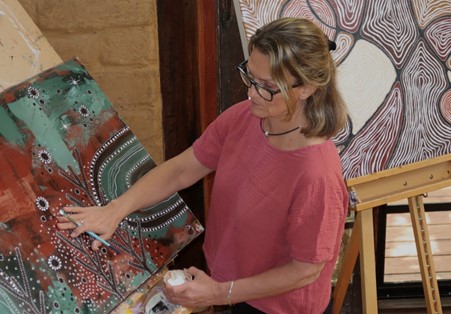What happens to an artist’s copyright when commissioned?


Michelle Holik, a textile designer based in Geelong, recently approached Arts Law for advice about the rights in her artwork designs. For close to a decade Michelle worked as a textile designer for leading homewares and soft furnishings brands, before setting up her own business a few years ago. Michelle is regularly commissioned by homewares companies both in Australia and overseas to create designs. In particular, Michelle wanted advice around what happens to her copyright when she is commissioned. Michelle informed us that it is a widely held belief among artists that when they are commissioned to create works their copyright is automatically transferred to the commissioner. Further, that it’s common for artists not to enter into written agreements when commissioned.
Arts Law arranged for one of its pro bono lawyers, Katherine Giles, to advise Michelle. Michelle was advised that subject to certain exceptions discussed below, when commissioned to create art, an artist’s copyright is not automatically transferred to the commissioner. A commissioner will only be the copyright owner if there is a written agreement signed by the artist, in which the artists gives away (ie “assigns”) their copyright to the commissioner. And artists should not feel under any obligation to give away their copyright. Indeed we generally do not encourage artists to give away their copyright. Once you assign your copyright, you are no longer the copyright owner and are unable to make copies of your own work, and thereby miss out on earning income from your own uses.
Michelle was advised that there are however some commissioning arrangements where the commissioner does automatically get the artist’s copyright – notably, if you are commissioned for payment: to take a photograph for a private or domestic use; or to paint/draw a portrait; or to make an engraving. Michelle was also advised that if she were an employee, as opposed to an independent contractor, then her employer would automatically own copyright in the material she created as part of her employment.
Artists should understand that while a commissioner does not automatically get their copyright, what the commissioner usually gets is an implied copyright licence from the artist to use the work for the purpose for which it was commissioned. So, if for example you are commissioned to create artwork for use on cushions, then the commissioner can use the artwork on the cushions. However, the commissioner would not be able to use it for any purposes beyond that, for example on tea towels, without the artist’s permission. Ultimately it depends on what is understood and agreed. Which is why it is so important to put agreements in writing. It flushes out the issues, provides clarity and ensures that everyone is on the same page. And of course, if there is a problem down the track, you can turn to the written agreement (sometimes also called a “licence”).
The agreement should set out the commissioning arrangement (timeframes, fees, etc) as well as stating that copyright remains with the artist and clearly setting out the licensing arrangements (ie the purposes for which the commissioner can use the work, where they can use it, and how long they can use it for etc). Agreeing on the parameters of the permitted use is imperative so as to avoid confusion and maintain control of your work.
Michelle was also advised that artists have moral rights. There are 3 types of moral rights: the right to be named for your work, the right to stop others claiming they created your work and the right not to have your work subjected to derogatory treatment. Moral rights should also be clearly dealt with in any agreement.
We are pleased to hear Michelle’s feedback on our advice:
“Arts Law’s advice was extremely helpful and going forward I feel confident in the knowledge of what my rights are and how best to deal with them when being commissioned. I didn’t know where to turn as a creative, and I found Arts Law to be a wonderful service. It is so important for artists to be aware of their rights, in order to protect their IP and be fairly compensated for their work.”
It is very satisfying for Arts Law to make a positive impact on artists’ awareness of their rights and, importantly, to dispel any myths around artists losing their rights – in particular here, the misconception that a commissioned artist automatically transfers ownership of copyright in the commissioned work to the commissioner.
Arts Law has many agreements available for artists including where artists are commissioned to create new works, or approached to license their pre-existing works. Artists should consider obtaining legal advice before signing any agreement and can ask Arts Law to review an agreement under our Document Review Service.




